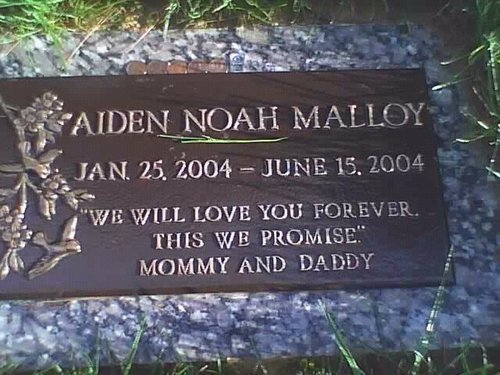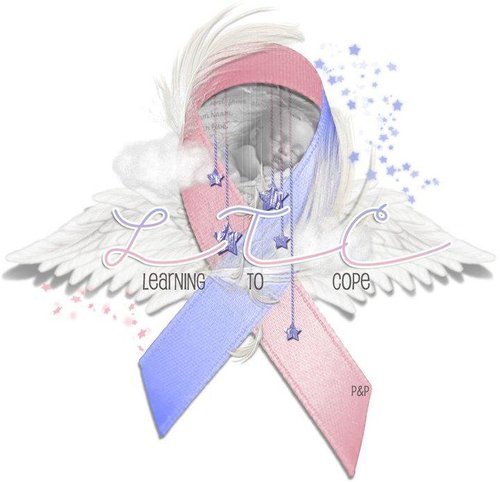Jestine Malloy is a mom, an inspiration, and a crusader. I am in awe of her spirit and desire to help people, though I wish she wasn't so knowledgeable about dealing with the loss of a child from sudden infant death syndrome. Jestine's son Aiden passed away from SIDS and she wants to share what she knows and how she survived it, not just for moms worried about SIDS, but for moms who are learning to cope.
This is her story, in her own words.
Learning to Cope: There is life after SIDS.
“I will love you forever, this, I promise.”
The hardest job in the world is undoubtedly being a mother. The job that no one ever wants to have is being a mother who is bereaved.
When my Aiden died on June 15, 2004, I felt like I was in a whirlwind of chaos and misunderstanding. From the moment I found him that morning, cold, lifeless, and grey, until almost six years later, I struggled.
I never knew you could feel your heart literally and physically break until the day I had to kiss the top of a tiny coffin, lay a single rose, and tell my son, my Aiden, goodnight for the very last time.

I never knew it was possible to love someone, my someone, my child, so much that I would have given my life to have one more minute, no, one more second to tell my son how much I loved him. I never knew that I had the ability to survive the death of my son.
After waiting months, Aiden’s death was finally ruled to be SIDS (Sudden Infant Death Syndrome).
SIDS strikes babies between the ages of 0 and 12 months, usually between 2 and 4 months;
SIDS is unpredictable, unpreventable, sudden, and silent;
SIDS is only determined after an autopsy, review of medical history, and examination of the death scene and therefore is ultimately a ‘diagnosis of exclusion’;
SIDS is not contagious;
SIDS is not child abuse;
SIDS is not the result of suffocation, vomiting, colds, illnesses, or other infections;
SIDS is not the result of an imperfect parent;
SIDS is not the result of you not loving your child enough;
SIDS is not your fault.
I refused help, support. I refused to grieve. Emotions boiled inside and when they reared their ugly face above the surface, I would douse the fire out with a mixture of alcohol and prescription drugs to numb it all back away. As the years went on, I became bitter, angry, mean. Everyone seemed to have forgotten that Aiden existed once upon a time. Aiden’s name was hardly mentioned. I single-handedly ruined and extinguished many friendships, my marriage, and alienated my family. No one understood. And because they didn’t talk about Aiden anymore, no one cared.
Years later, after neglecting my emotional health and refusing to cope, I had turned into an obsessive compulsive control freak with a drinking problem. The one person I had left in my life finally warned me that unless I dealt with this, they had to walk away; they could not see me self-destruct anymore.
Some bereaved mothers, including myself, feel as though if they aren’t miserable, this means that they love their child or miss their child less. My fear, as ridiculous as it sounds to me now, was that I would forget Aiden if I forgot how painful it felt to lose him.
Some bereaved mothers, including myself, believe that they have been punished. I, on many occasions, asked what I did to deserve this.
Some bereaved mothers, including myself, believe they can do this alone, without support. I am living proof that you cannot.
I had to reach out. I had to find someone, anyone, that I could reach with my story, with Aiden’s story, and help steer them from that path of isolated misery. In return, I ended up getting my life back. The memories of his life and the tragedy of his death ironically are the foundation of my strength.
More importantly, now Aiden will never be forgotten and his memory will continue to live on, not only in my heart, but in the hearts of the thousands we have been able to connect with.
My son, Aiden Noah Malloy, was more than just a 4 1/2-month-old baby who died. He is more than just another SIDS statistic. Aiden’s life had purpose. Aiden’s life held meaning. It had to. And as his mother, it is now my responsibility to make sure his life and subsequent death didn’t happen in vain.
Although my heart will be forever broken, I have learned to cope. A bereaved mother will never heal from the wound inflicted on her heart after having to bury her own child. However, there is life after death. The realistic hope is that we learn to manage, we learn to give ourselves permission to smile again, to cry, to talk about our children without feeling shame, to reach out to support one another, to ultimately learn to cope.

If you are suffering, need support, or would like to educate yourself, please visit us on Facebook at Facebook.com/learningtocope or on the web at LearningtoCope.weebly.com.
Thank you for sharing your story, Jes. Your strength is an inspiration.




